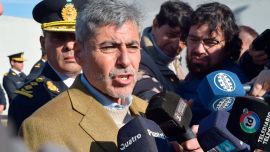A deal between the European Union and Mercosur that “makes everyone happy” may not be possible so the South American trade bloc is mulling breaking the treaty into parts, Argentina’s foreign minister said.
President Javier Milei’s top diplomat, Diana Mondino, offered the grim assessment after meeting her French counterpart, Foreign Minister Stéphane Séjourné, in Buenos Aires.
“We lament that they do not see the enormous potential this would have for both parties to be able to grow,” Mondino said of the EU at a joint press conference Monday afternoon.
Negotiations between Mercosur and Europe are ongoing despite hitting a wall in recent months. Opposition is particularly stiff in France, where farmers have blockaded highways over a deal they they say would enable cheap imports from countries with lower environmental standards.
The South American bloc and the EU have been in talks to clinch an accord for more than two decades and an agreement was announced in 2019 but never implemented.
Mercosur — made up of Brazil, Argentina, Uruguay, Paraguay and soon Bolivia — discussed the idea of shifting their focus from Europe to other regional trading groups when foreign ministers of those countries met in Paraguay last month, Mondino said.
She acknowledged that Argentina, under the administration of former President Alberto Fernández, had been the primary opponent of an EU deal before Milei took office in December.
Séjourné reiterated France’s opposition to the treaty in its current form, saying “there cannot be any advances without France.” The diplomat stressed that there had to be political agreements between the South American bloc and Europe — “and not with Asia.”
In response, Mondino said Argentina would work with all countries.
by Manuela Tobias, Bloomberg



















Comments